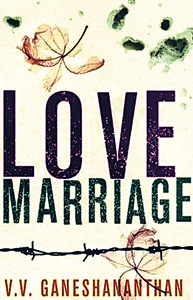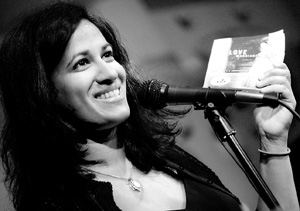| V.V. Ganeshananthan - you may call her Sugi - is full of surprises. She plays a mean tenor saxophone (bee-bop if you must know) and is synesthetic – a condition which has her linking things like words or people’s names with unexpected sensory perceptions like smell or colour; but, she assures me, “I might see someone as brown, and they’d be perfectly nice.” However, it is for her novel, Love Marriage, now long listed for the Orange Prize for fiction that this young journalist and author is best known.
Her debut novel will surprise those who expect it to deliver on its deceptively chick-lit sounding title. The novel explores not only love, but violence and how both can transform the lives of entire communities, individual by individual. It is also a novel about exile, told by a child of Tamil immigrants.
Her love of her culture finds its way into the book, from the chapters that use Tamil numbers (ondu through to ompathu) and begin with excerpts from the Tirrukural down to the way in which she seems to pause over the words in the traditional wedding ceremony (punyathnam, sangalppam, homm), as if to savour their bouquet.
The narrator Yalini, is dropped into a story, much older than she is, for whose complexity she is not quite prepared, when she finds herself caring for her dying uncle Kumaran, a former member of the militant Tamil Tigers. Over many days spent by his sick bed, she begins to accept that the violence and strife her family fled from has in fact travelled with them, and is not “a relic of the Sri Lankan past, but very much a part of her Western present.” Yalini follows the slender thread of her own history through the tapestry of the conflict in Sri Lanka, searching for meaning in the way her own life is entwined with a series of familial ties and marriages.
For those who know something about the author, there is a near irresistible desire to point out the obvious parallels. Sugi’s own parents left Sri Lanka just before the riots in 1983, but aside from a few other clearly autobiographical elements, that would be where the resemblance ends, says the author. Having been brought up an American citizen, Sugi is very much a child of immigrants, and now calls a different country home. In fact, much of her research for the book was done from a distance – and involved prodigious amounts of reading, which included both the unusual (Murder in the Pettah) and the expected (Inside an Elusive Mind – Prabhakaran).
She has only made a few brief visits to the island. “Coming to Sri Lanka is obviously very special for me, for reasons that have very little to do with my book,” she says, adding that while “for most people, the easy answer is to think that the story is true,” she’d rather they judged the novel on its merits as a work of fiction.
It’s a tribute to the author though, that Love Marriage is a novel that feels true. Yalini narrates her story in fragments, creating a patchwork of stories, many of which have the fluidness of stories overheard by chance, whose details change with the teller and the time of the telling – “And that’s something I’ve dealt with as both a journalist and a member of a family: competing narratives. I wanted to acknowledge that, and the existence of multiple stories.”
 |
There is a proliferation of many types of marriages in the book – from the self-arranged marriage to the marriage without consent, from the cousin marriage to the improper marriage, there is a refusal to limit one to the conventional choice between love and arranged marriages. Sugi drew a parallel when she said in interviews that, “the Sri Lankan diasporas’ political views are sometimes understood as two opposite poles with nothing in between. (As though arranged marriage and love marriage were the only two kinds of marriage.) But there are so many communities and opinions and conversations out there.”
Having begun writing the novel when she was 18 years old, Sugi who is now 26, will be the first to point out that the novel itself has undergone some dramatic changes over eight years. The book was initially written as her senior thesis before graduating from Harvard. “The first draft of the novel didn’t have an uncle in it,” she says referring to Kumaran who is the pivot on which the story now turns. With a man like that for a primary character, Sugi has long accepted that “this is not a book that’s going to please everyone,” but since that is not her goal –“a book is not a democracy, it’s a benevolent dictatorship” – she has already begun work on a second novel.
Currently, the vice president of the South Asian Journalists Association, she has written and reported for The Atlantic Monthly, The Wall Street Journal, The Chronicle of Higher Education and of late has begun blogging for the site Sepia Mutiny.
Looking forward, she says: “I’ve had people who’ve said, now you’ve published a book, and that’s great. The trick now, is to write two. And then the trick will be to write three. And every step along the way, I’ve had trouble believing it was real,” she says, adding that her second novel will utilize some of the ideas and information she came across while researching the first.
In the end, one finale in Love Marriage (there seem to be at least three) would be believable as the voice of Sugi herself - if you’re willing to stretch a metaphor. Though rooted in her parents’ culture in often inexplicable ways, Yalini makes it clear that an arranged marriage is out of the question for herself: “But although we are the children of our parents, we have entered other countries in which the rules of Marriage ... do not always apply.”
|


